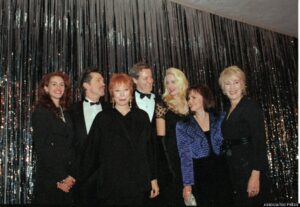
Now and Then: In Two ‘Steel Magnolias,’ the Times Are Not A-Changin’
The first thing one notices about “Steel Magnolias” (Herbert Ross, 1989) is the hair. Truvy’s Beauty Shop overflows with tight-rolled pastel curlers and foot-high teases, held in place by enough hairspray to commit Arson — a style so far out of fashion it seems historical, as rococo as Marie Antoinette’s bedsheets.
Adapted by Robert Harling from his play of the same name, the Southern-fried melodrama, like its stiff bouffants and feathered tips, embodies what Susan Sontag called “the ultimate Camp statement: it’s good because it’s awful.” There’s love in it, as Sontag required, and a comic understanding of this embittered world — its climactic moment, a tragic, pained roar worthy of the Greeks, slips seamlessly into farce — but awful it is. Each of its scenes, shoddily built from sobs and one-liners, moves us inexorably toward the tearjerker of an ending. The characters, perhaps because they’re relics of another era’s understanding of womanhood (that era, by the way, is not the 1980s so much as the 1950s), do not develop. They stew.
The six small-town Louisiana friends in Truvy’s (Dolly Parton) orbit manage to achieve a kind of chemistry, with the sharp-tongued Clairee (Olympia Dukakis) and sharp-elbowed Ouiser (Shirley MacLaine) leading the way, but the film’s syrupy, antique portrait of women whose only anxieties or cares are husbands, children, and event planning left me feeling as though I missed the memo. Without keeping camp in mind at every turn, “Steel Magnolias” starts to sound like the death knell of second-wave feminism: only nine years after “9 to 5” (Colin Higgins, 1980), the stellar comedy of empowered working women, Ross’ film seems to take place on another planet.
Which is why Lifetime’s “modern” retelling, newly released on DVD by Sony Pictures Home Entertainment, strikes me as a strange gambit. Despite its game, all-star cast of African American actresses (Queen Latifah, Alfre Woodard, Phylicia Rashad, Jill Scott), this “Steel Magnolias” only feigns originality. It merely nods at the present with references to Michelle Obama and Beyonce; in Truvy’s comment, “if you can achieve puberty, you can achieve a past,” “the age of Facebook” replaces “the ’80s.” Playing pop-culture Mad Libs with the script seems to have fooled most of the critics, who failed to hold the film’s feet to the fire for its nearly line-by-line retread of already old-fashioned source material. Like Gus Van Sant’s shot-by-shot remake of “Psycho” (1998), which Roger Ebert rightly called “pointless” and masturbatory, Lifetime’s “Steel Magnolias” is an object lesson in folk wisdom: nothing ventured, nothing gained.

The new cast may manage to find fresh rhythms in the lines, and the remake’s relative restraint (including the hairdos) is stylish where the former was garish. In losing much of the camp, however, Lifetime’s “Steel Magnolias” also loses the earlier version’s easiest excuse (and excuse is all it is, honestly). That there is no real attempt to investigate how almost a quarter-century or being African American in the South might change women’s experiences and perspectives can no longer be explained away with, “but it’s not supposed to be serious!” It’s bad enough that the 1989 original made “9 to 5” look like “Rules for Radicals.” A remake without revision is at best an empty shell, at worst a betrayal of promise.
Then again, the ratings success of “Steel Magnolias” may be sadly emblematic of how little has changed since 1989, in reality as in Hollywood’s version of it. Women still make 77 cents on the dollar compared with men in the same jobs. Women are still expected to do most of the housework, even when both spouses work full-time. Even the otherwise forward-looking Cannes Film Festival features yet another male-centric competition lineup (Valeria Bruni-Tedeschi is the only woman director, and even that’s an improvement over last year’s big zero).
Shelby’s statement, in both films, that she’d “rather have 30 minutes of something wonderful than a lifetime of nothing special” settles for less that what women deserve. As Sontag recognized, “we are better able to enjoy a fantasy as fantasy when it is not our own.” The wrongheaded fantasy of “Steel Magnolias,” now and then — that bad husbands are trials to be borne, that women should run beauty salons but not companies — remains a little close for comfort. The hair may be sleeker, but the politics are too much the same.
Lifetime’s “Steel Magnolias” is now available on DVD. The 1989 theatrical version is available on Blu-ray, DVD, and VOD.
